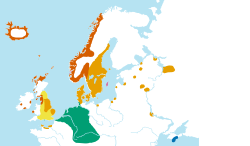English language: Difference between revisions
mNo edit summary |
|||
| Line 34: | Line 34: | ||
== English vocabulary == | == English vocabulary == | ||
* English contains | * English contains about 600,000 words | ||
** when | ** as counted by the Oxford English Dictionary, there are 171,476 words in current use and 47,156 obsolete words | ||
*** the Dictionary also counts 250,000 "distinct" words, excluding inflections (word ending changes) | |||
** when word definitions are counted, English has 1,402,895 words | |||
*** i.e., the word "love" generally has five definitions in the dictionary | |||
** when counting "headwords" and "lemmas" (words produced from a headword), English has 578,707 words | |||
*** "headword" = a word from which other words are derived, such as "break > broken > broke | |||
** see | |||
*** [https://web.archive.org/web/20170909203258/https://en.oxforddictionaries.com/explore/how-many-words-are-there-in-the-english-language How many words are there in the Engli... | Oxford Dictionaries (archive.org)] | |||
*** [[wikipedia:Corpus_linguistics#English_corpora|Corpus linguistics - Wikipedia]] | |||
*** [https://www.babbel.com/en/magazine/language-most-words Which Language Has The Most Words? (babbel.com)] | |||
*** [[wikipedia:List_of_dictionaries_by_number_of_words|List of dictionaries by number of words - Wikipedia]] | |||
{| class="wikitable" | {| class="wikitable" | ||
|+English Language Percent Distribution of Parts of Speech | |+English Language Percent Distribution of Parts of Speech in the Oxford English Dictionary | ||
!Adjectives | !Adjectives | ||
!Adverbs | !Adverbs | ||
| Line 47: | Line 57: | ||
!Verbs | !Verbs | ||
|- | |- | ||
| | |25% | ||
| | | | ||
| | | | ||
| | | | ||
|50% | |50% | ||
| | | | ||
| Line 77: | Line 87: | ||
{| class="wikitable" | {| class="wikitable" | ||
|+English Language Percent | |+English Language Percent Frequency of Use of Parts of Speech | ||
! | |||
!Adjectives | !Adjectives | ||
!Adverbs | !Adverbs | ||
| Line 87: | Line 98: | ||
!Verbs | !Verbs | ||
|- | |- | ||
|2.5 | |Conversational | ||
|5 | |2.5% | ||
|4.5 | |5% | ||
|4.5 | |4.5% | ||
| | |4.5% | ||
| | |15% | ||
| | |5.5% | ||
| | |16.5% | ||
|12.5% | |||
|- | |||
|Formal/ Academic | |||
|10% | |||
|3% | |||
|5% | |||
|10% | |||
|30% | |||
|15% | |||
|4% | |||
|10% | |||
|- | |- | ||
| | | | ||
|Adjectives | |||
|Adverbs | |||
| | | | ||
| | | | ||
|Nouns | |||
| | | | ||
| | | | ||
|Verbs | |||
|- | |||
| | | | ||
| | | | ||
| | | | ||
| Line 114: | Line 138: | ||
| | | | ||
|} | |} | ||
* source: [https://ginsengenglish.com/blog/parts-of-speech-in-english#:~:text=Take%20a%20look%20at%20the%20following%20table%20showing,to%20give%20a%20general%20sense%20of%20the%20proportions. The 9 Parts of Speech in English | Ginseng English] (from Biber, et. al., (1999). ''Longman Grammar of Spoken and Written English.)'' | |||
[[Category:Language Arts]] | [[Category:Language Arts]] | ||
[[Category:Linguistics]] | [[Category:Linguistics]] | ||
[[Category:Language]] | [[Category:Language]] | ||
Revision as of 17:09, 10 April 2023
English word origin[edit | edit source]
Angles / Anglo-Saxon[edit | edit source]
- from the Angles, a Germanic peoples who migrated to the British Islands in the 400s-600s AD.
- part of the Anglo-Saxon invasions
- English is one of the "Anglo-Frisian" languages
Language origins of Modern English[edit | edit source]
| Germanic | Old French | Latin | Greek | Other | Proper Names |
|---|---|---|---|---|---|
| 26% | 29% | 29% | 6% | 6% | 4% |

Old West Norse dialect
Old East Norse dialect
Old Gutnish dialect
Old English
Crimean Gothic
Other Germanic languages with which Old Norse still retained some mutual intelligibility
English vocabulary[edit | edit source]
- English contains about 600,000 words
- as counted by the Oxford English Dictionary, there are 171,476 words in current use and 47,156 obsolete words
- the Dictionary also counts 250,000 "distinct" words, excluding inflections (word ending changes)
- when word definitions are counted, English has 1,402,895 words
- i.e., the word "love" generally has five definitions in the dictionary
- when counting "headwords" and "lemmas" (words produced from a headword), English has 578,707 words
- "headword" = a word from which other words are derived, such as "break > broken > broke
- see
- as counted by the Oxford English Dictionary, there are 171,476 words in current use and 47,156 obsolete words
| Adjectives | Adverbs | Conjunctions | Determiners | Nouns | Prepositions | Pronouns | Verbs |
|---|---|---|---|---|---|---|---|
| 25% | 50% | 7% | |||||
| Adjectives | Adverbs | Conjunctions | Determiners | Nouns | Prepositions | Pronouns | Verbs | |
|---|---|---|---|---|---|---|---|---|
| Conversational | 2.5% | 5% | 4.5% | 4.5% | 15% | 5.5% | 16.5% | 12.5% |
| Formal/ Academic | 10% | 3% | 5% | 10% | 30% | 15% | 4% | 10% |
| Adjectives | Adverbs | Nouns | Verbs | |||||
- source: The 9 Parts of Speech in English | Ginseng English (from Biber, et. al., (1999). Longman Grammar of Spoken and Written English.)